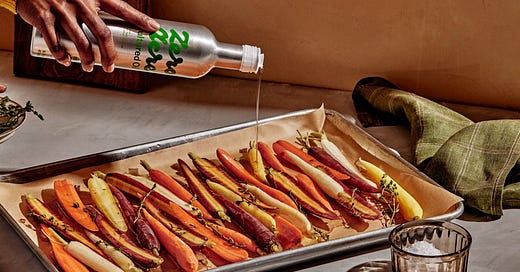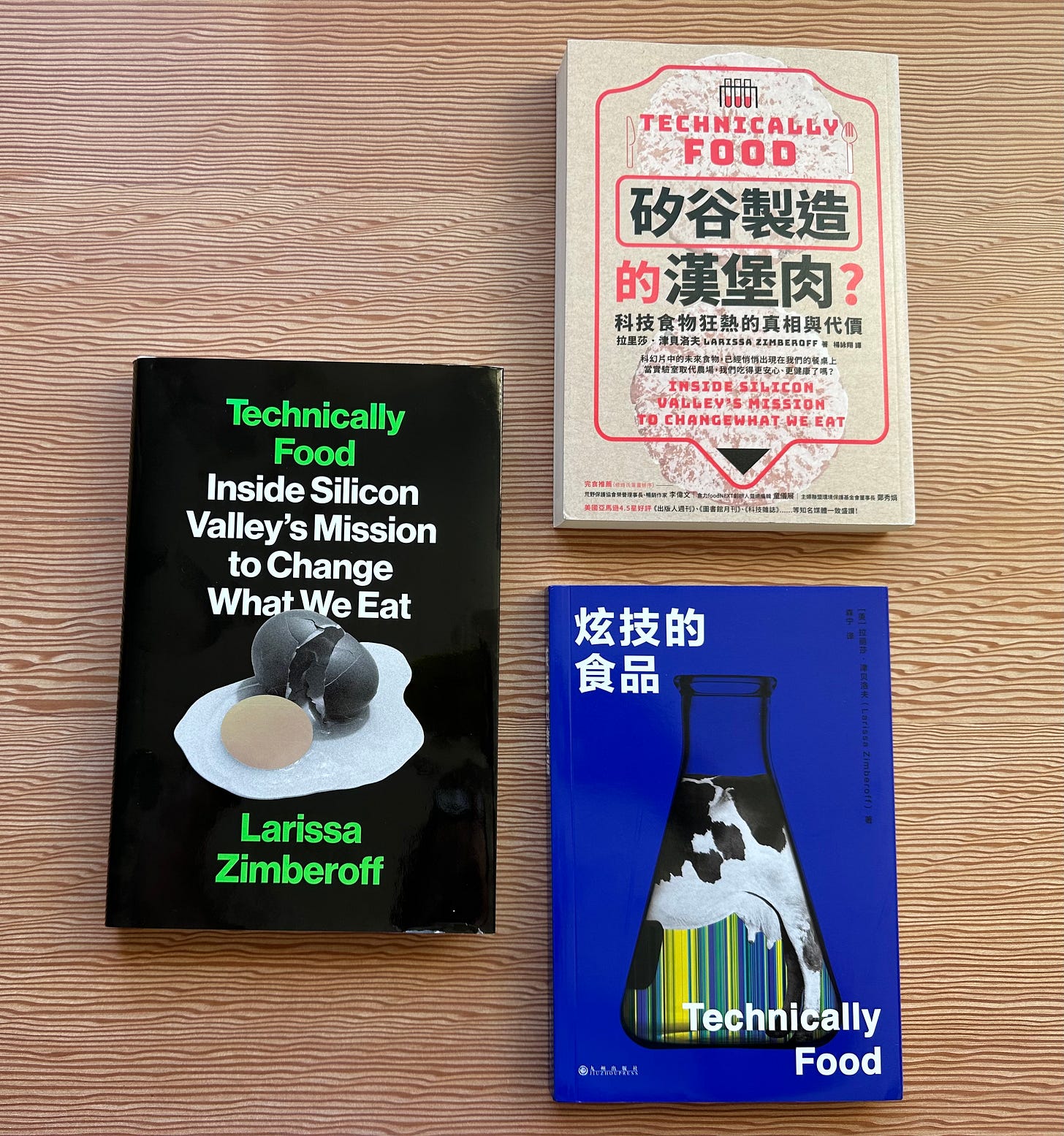Peak oil
What I talk about when I talk about fast casual trends, Issa Rae-branded Prosecco and mycelium jerky.
Thank you, dear readers, for being here and to all the new folks who have subscribed. Welcome to Technically Food, my newsletter about all things food--mostly. I try to ask thought provoking questions that I don’t or can’t always answer. If I haven’t touched on something you’d like to know more about, please get in touch. I love to hear from you, which you can do by leaving a comment at the bottom or replying to this email. If you’d like to upgrade to a paid subscription, I send out one paid newsletter a month. The next one goes out on Friday, October 27th.
Moving on.
The email that welcomes people to my newsletter asks, ‘What did you eat for breakfast?’ It’s an innocuous question but one I genuinely want to know. I’m endlessly curious about how people fuel their bodies. It’s something we can all answer, although on writing this here I can see there’s a way this might backfire like if someone can’t afford to eat or feels judged about what they choose to eat. (As my therapist boyfriend might remind us: I invite you not to feel judged.)
On this topic around what we choose to eat, there’s the first level—I choose to eat this or that apple (whatever isn’t Fuji or Gala please) or to eat this or that burger (plant-based, beef, old school veggie burger) or this or that salad topped with chicken and root vegetables (I’ll have the roasted white sweet potato salad at Souvla).
We can make changes to what we eat on our own, but often changes are made for us, and sometimes unwittingly. This can be bad like when serving sizes change or when ingredient quality goes down; or it can be good.
There’s a new trend in fast casual. What’s unique is that these changes are essentially hidden to all but the very attentive. It’s in the oil that’s used on the grill and in the oven. Sweetgreen, a salad chain I’ve eaten at, announced this week that it’s transitioning the oil used for cooking proteins, grains, and vegetables from high oleic sunflower oil to extra virgin olive oil.

Both oils have health benefits. For the curious, high oleic means the oil is more stable and may have heart health advantages versus saturated fats. If we’re comparing it to olive oil then olive oil has a tiny edge. They’re both high in vitamin E, but EVOO is higher in vitamin K, which strengthens bones. And for Sweetgreen, it also has way more culinary appeal and caché.
In another example: Hopdoddy, a burger chain I have not tried with 46 locations, changed its fry oil from soybean to Zero Acre Farm’s fermentation-based oil made from sugarcane microbes that express oil (that are fueled by sugar from sugarcane). Hopdoddy also changed some, but not all, of its meat to regenerative ranches, and they dropped commercial plant-based burgers and are now only using their in-house crafted veggie burger. The oil will launch initially in a few locations in Texas.
Speaking of Texas, I’m on a plane bound for Houston. It’s 5:42am. How’s that for early?
Why would these chains decide to spend more money on an ingredient as basic as oil? I emailed Jeff Nobbs, the CEO of Zero Acre to learn more. He said that Hopdoddy’s made the transition because its fries and chicken tenders tasted better. (Imagine that taste test?) It also chose the oil because it’s more sustainable—Nobbs says Zero Acre has a significantly smaller environmental footprint than soybean oil.
In an independent LCA — life cycle analysis — done by the bay area company on its oil, they found it emits 86% less greenhouse gas emissions than soybean oil and uses 83% less water. Perhaps because soybeans are so prolifically planted in the world and massive scale of anything is damaging. It also comes in an aluminum bottle that is lighter to ship and eminently moer recycleable.
I’ve used Zero Acre’s oil at home. It’s clear and flavorless, like rapeseed oil, with a high smoke point. It came in handy for sautéing veggies on the stove and I enjoyed having a backup to my more expensive olive oils. The functionality still seems a better fit to food service than to my home kitchen. (I wonder if I’m biased by light and clear colored oil?)
I still wanted to know the cost. Nobbs told me that Zero Acre costs more per pound than soybean oil but using it allowed Hopdoddy to use less, which brings the cost closer to parity with soybean oil.
The Sweetgreen changes—sunflower to EVOO—are more curious. I chatted in brief with Nicolas Jammet, but it went too short. A change like this, to me, appears to be about culinary appearance. Here’s the company’s description in its press release: “The mission-driven restaurant brand serving healthy food at scale.” Sweetgreen wants to be known for their ingredients and to make people think they’re getting something that could be made at home.
You know how when great home cooks talk about going out to eat and they say things like: ‘Yeah, but I could make it better at home.’ Sure, maybe. (I love to cook, but I have as many misses as wins.) Restaurant food is better because they use more oil, butter and salt.
We, the collective we, want our restaurants to use better ingredients and source higher quality goods. We, the people who like to eat out, want to be able to pay the higher price for good decisions. We, the people who respect farmers and the folks that grow our food, want to pay them more for their work, from the owner of the farm down to day laborers.
I like seeing quiet changes like these that can possibly make a difference until at some point so many nudges have been made that we no longer need a press release and we no longer need to fret about our food choices.
Enjoy your weekend.
Other tidbits:
Celebs are either investing in food-tech or they’re launching Prosecco at Target such as Issa Rae of Insecure. (Or cereal like Snoop Dogg and fro-yo like Cher as mentioned in this newsletter.) I blame the writers strike, why else are these stars going after alternative forms of income?
“On the campus of UC Berkeley, adjacent to an academic department that less than a century ago erroneously declared the Ohlone people extinct, Cafe Ohlone stands as a testament to the strength and permanence of Ohlone people and culture.” I didn’t get the chance to dine there when it was open, but I hope when it reopens I can be there. Cafe Ohlone is the only Ohlone restaurant in the world. If this kind of thing resonates with you, please consider funding their efforts in recapturing a tiny parcel of their land.
You can buy Zero Acre oil here. (I make no money on the link or the oil.)
Where you can find me:
I wrote about mycelium jerky, which is delicious. It’s not a puff piece, but it is a bit of a puff topic. My favorite was the sweet chili.
My book is translated and can be found in bookstores in China, Taiwan and Korea!






As a close follower and observer of these developments, and in conversations with other founders, the tightening of funding has slowed things down considerably at a moment when they should be accelerating. It's almost as if the headwinds experienced by Impossible and Beyond have sent the jitters into investment considerations -- but for me that's like aligning an apple with an orange. Will look for your Fast Company piece. Thanks as always...
I wonder if the Sweetgreen change has to do with all the TikTok anti-seed-oil mania? https://www.morningbrew.com/daily/stories/2022/10/06/why-does-every-fitness-influencer-suddenly-hate-seed-oils